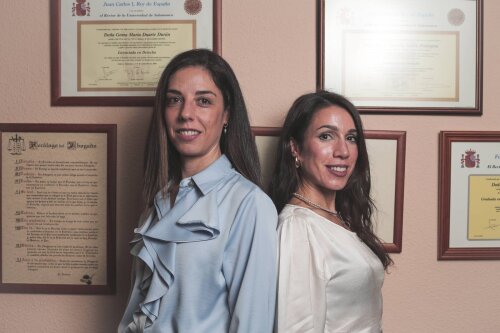Best Energy, Environment & ESG Lawyers in Madrid
Share your needs with us, get contacted by law firms.
Free. Takes 2 min.
List of the best lawyers in Madrid, Spain
About Energy, Environment & ESG Law in Madrid, Spain
Energy, Environment and ESG (Environmental, Social and Governance) law encompasses all legal matters that relate to the production and use of energy, protection of the environment, and business practices that address environmental, social and governance concerns. In Madrid, Spain, these areas are becoming increasingly important as public awareness grows and regulations continue to evolve. The Spanish legal system, alongside European Union directives, sets out comprehensive regulations to ensure sustainable development, limit environmental damage, and encourage responsible corporate governance. Both private individuals and companies operating in Madrid must be aware of these legal obligations to avoid penalties and promote good practices.
Why You May Need a Lawyer
There are several situations where legal assistance in Energy, Environment and ESG matters can be crucial in Madrid. Companies embarking on new construction projects may need help navigating environmental permits and impact assessments. Homeowners or tenants might need advice on energy efficiency standards for renovations or installations of renewable energy systems. Businesses can face challenges ensuring that their operations comply with ESG regulations to avoid sanctions or to improve their market reputation. Disputes over contamination, noise pollution, waste management, or liability for environmental damage often require experienced legal representation. A specialist lawyer can help interpret complex regulations, secure the necessary permits, manage compliance risks, and represent clients before the authorities or in court.
Local Laws Overview
Madrid's legal framework in the fields of energy and environment is built upon Spanish national laws, regional regulations specific to the Community of Madrid, and European Union directives. The key national legislations include the Law on Environmental Responsibility, the Law on Integrated Pollution Prevention and Control, the Law on Climate Change and Energy Transition, and the Royal Decree on energy efficiency in buildings. The Community of Madrid also has its own standards for air quality, waste management, and water protection. Companies are now encouraged and in some cases required to implement ESG policies and reporting mechanisms, in alignment with EU and Spanish transparency initiatives. Energy production, especially renewable projects like solar and wind, must comply with local zoning and environmental impact assessments. Both businesses and individuals are subject to enforcement by local and national authorities if found in violation of these laws.
Frequently Asked Questions
What is ESG and why is it important for businesses in Madrid?
ESG stands for Environmental, Social, and Governance. It refers to criteria for a company's operations that socially conscious investors use to screen potential investments. In Madrid, as in other EU regions, ESG is important for legal compliance, reputation, and access to funding. More regulations require companies to demonstrate responsible practices and ESG reporting.
Do I need an environmental permit for my new business premises?
Most new business activities in Madrid are subject to environmental permits or licenses, especially if the operations involve the use of hazardous materials, produce emissions or waste, or could impact local ecosystems. The specific permits required will depend on the type and scale of your business.
What legal obligations do property owners have regarding energy efficiency?
Spanish law requires property owners to ensure their buildings meet certain energy efficiency standards, particularly for new constructions or major renovations. These standards are aimed at reducing energy consumption and encouraging the use of renewable sources.
How does Madrid regulate renewable energy projects?
Renewable energy projects must comply with both national and regional regulations. This includes securing permits, carrying out environmental impact assessments, and adhering to grid connection requirements. The Community of Madrid also supports renewable energy through specific incentives.
Who is responsible for environmental contamination on private land?
Under Spanish and regional law, the "polluter pays" principle often applies. The party responsible for causing the contamination is generally liable for its cleanup and any associated damages. In some cases, property owners can also be held responsible even if they did not cause the pollution.
What penalties can companies face for environmental violations?
Penalties vary depending on the severity and type of violation. Consequences can include fines, orders to cease activities, mandatory remediation of environmental damage, and reputational harm. Repeat or severe offenders may face criminal charges.
How are disputes over environmental damage resolved?
Disputes can be resolved through negotiation, mediation, or legal proceedings before administrative bodies or courts. Specialist legal advice is often necessary to determine liability and calculate damages.
Are there incentives for improving energy efficiency in Madrid?
Yes, both national and regional governments in Spain offer incentives for energy efficiency improvements, such as tax credits, grants, and subsidized loans. These are typically available for building renovations, renewable energy installations, or modernization of industrial processes.
What ESG reporting obligations exist for companies?
Certain companies, especially those publicly traded or of a certain size, must prepare and publish regular non-financial reports detailing ESG practices and performance. This obligation is shaped by both EU regulations and Spanish law.
Can neighbors object to environmental permits?
Yes, local residents and stakeholders have the right to participate in public consultation processes and can object to the granting of environmental permits or the construction of projects that may impact the environment. Their concerns must be considered by the authorities.
Additional Resources
For those seeking further information or assistance, the following resources may be helpful:
- Ministry for the Ecological Transition and the Demographic Challenge of Spain (Ministerio para la Transición Ecológica y el Reto Demográfico) - the principal governmental body for environmental and energy policy. - Community of Madrid Environmental Agency (Consejería de Medio Ambiente, Vivienda y Agricultura) - manages regional environmental programs and regulations. - Spanish Renewable Energy Association (Asociación de Empresas de Energías Renovables - APPA) - provides information on renewable energy regulations and incentives. - Spanish Clean Energy Cluster - a network supporting sustainable energy solutions. - Institute for Corporate Governance (Instituto de Buen Gobierno Corporativo) - offers guidance on ESG best practices in Spain.
Next Steps
If you need legal assistance in Energy, Environment or ESG matters in Madrid, it is advisable to:
- Identify the specific issue or challenge you are facing. - Collect any relevant documents, permits, correspondence, or reports. - Research local law firms or independent lawyers specializing in these fields. - Book an initial consultation to assess your legal needs and possible strategies. - Follow through with professional advice to ensure compliance and protect your interests.
Acting early and securing expert legal guidance can help you avoid costly mistakes, reduce risks, and identify opportunities to improve your organization’s environmental and social impact within the legal framework of Madrid, Spain.
Lawzana helps you find the best lawyers and law firms in Madrid through a curated and pre-screened list of qualified legal professionals. Our platform offers rankings and detailed profiles of attorneys and law firms, allowing you to compare based on practice areas, including Energy, Environment & ESG, experience, and client feedback.
Each profile includes a description of the firm's areas of practice, client reviews, team members and partners, year of establishment, spoken languages, office locations, contact information, social media presence, and any published articles or resources. Most firms on our platform speak English and are experienced in both local and international legal matters.
Get a quote from top-rated law firms in Madrid, Spain — quickly, securely, and without unnecessary hassle.
Disclaimer:
The information provided on this page is for general informational purposes only and does not constitute legal advice. While we strive to ensure the accuracy and relevance of the content, legal information may change over time, and interpretations of the law can vary. You should always consult with a qualified legal professional for advice specific to your situation.
We disclaim all liability for actions taken or not taken based on the content of this page. If you believe any information is incorrect or outdated, please contact us, and we will review and update it where appropriate.
Browse energy, environment & esg law firms by service in Madrid, Spain
Madrid, Spain Attorneys in related practice areas.















